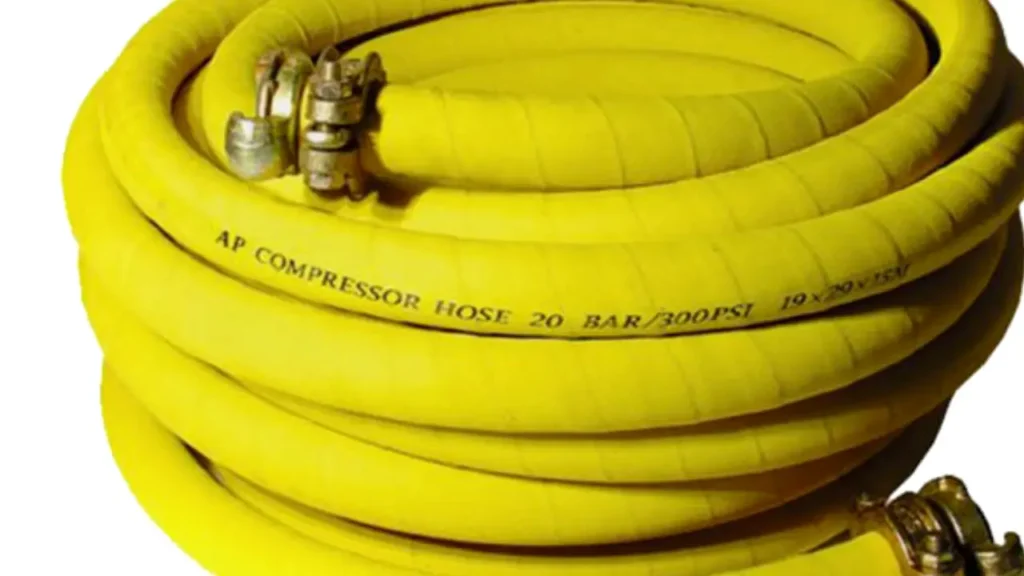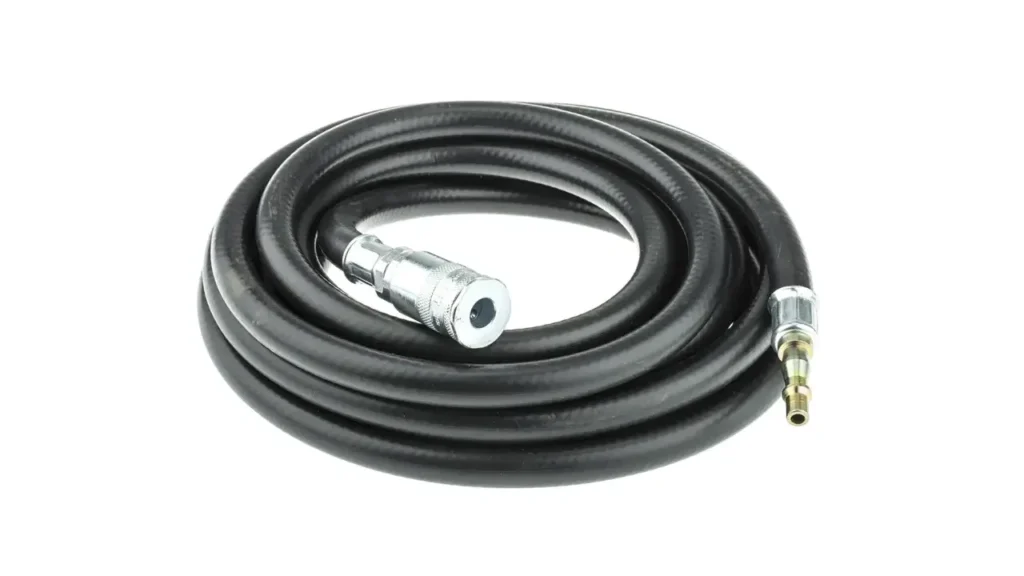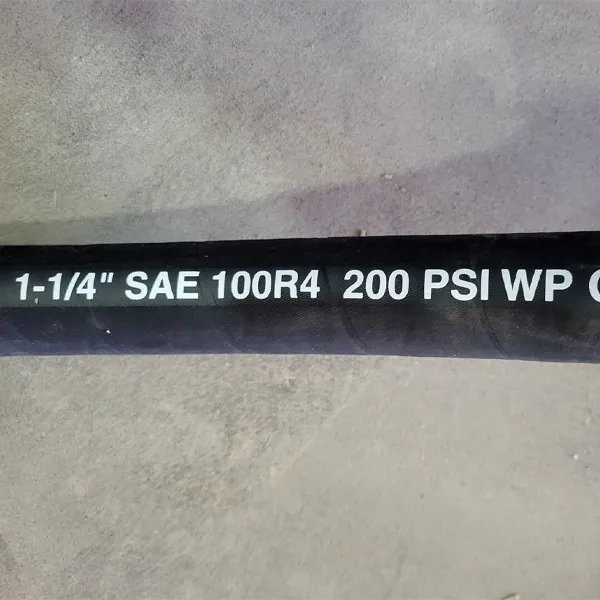The compatibility of hydraulic hoses with air compressors is a common query in industrial settings. While both systems involve fluid transfer under pressure, they utilize distinct media and operating conditions. This blog post aims to clarify the suitability of hydraulic hoses for air compressor applications, addressing potential safety concerns and performance implications.
We will explore the fundamental differences between hydraulic and air systems, focusing on material compatibility, pressure ratings, and temperature tolerances. Understanding these distinctions is crucial for ensuring safe and efficient operation, preventing equipment damage, and avoiding hazardous situations.
What Is Air Compressor?
An air compressor is a mechanical device that increases the pressure of air by reducing its volume. It works by forcing air into a smaller space, thereby raising its pressure, and then releasing the compressed air for various applications. These applications range from powering pneumatic tools and inflating tires to operating industrial machinery and supplying air for medical equipment.
Can You Use Hydraulic Hose for Air Compressor?

While hydraulic hoses might seem robust, they are generally not the ideal choice for air compressor applications. Hydraulic hoses are designed to handle non-compressible hydraulic fluids under high pressure, whereas air compressors deal with compressible air. This fundamental difference in fluid properties leads to varying requirements for hose construction and materials. Using a hydraulic hose for air can lead to premature wear, reduced efficiency, and potential safety risks.
The materials and construction of hydraulic hoses are optimized for hydraulic fluids, which have different temperature and chemical properties than compressed air. Hydraulic hoses may not effectively dissipate the heat generated by compressed air, potentially leading to hose degradation and failure. Additionally, the internal structure of a hydraulic hose might not be designed to handle the pulsations and vibrations associated with air compressors, reducing the hose’s lifespan.
For air compressor applications, it’s crucial to use hoses specifically designed for compressed air. These hoses are typically made from materials like rubber, PVC, or polyurethane, which offer better heat resistance, flexibility, and durability under air pressure. They are also engineered to handle the pulsations and vibrations inherent in air compressor systems, ensuring safe and efficient operation. Using the correct type of hose minimizes the risk of leaks, bursts, and equipment damage, ensuring a longer lifespan for both the hose and the air compressor.
Can You Use Hydraulic Hose for Air Conditioning?
No, you should not use hydraulic hoses for air conditioning systems. Hydraulic hoses and air conditioning hoses are designed for distinctly different purposes and fluids, leading to significant compatibility and safety concerns. Hydraulic hoses are engineered to handle high-pressure hydraulic fluids, like oils, and are constructed with materials that may not be compatible with the refrigerants and pressures found in air conditioning systems.
Air conditioning systems use refrigerants, which can be gaseous or liquid, and operate within specific pressure and temperature ranges. The hoses used in these systems are designed to handle these refrigerants and are often made from materials that are resistant to refrigerant permeation and degradation. Using a hydraulic hose in an air conditioning system could lead to leaks, system inefficiency, and potentially hazardous situations due to incompatible materials and pressure ratings.
Can Hydraulic Hose Be Used as an Air Hose?
While hydraulic hoses are robust and designed for high-pressure applications, they are generally not recommended for use as air hoses. Hydraulic hoses and air hoses serve different purposes and are constructed with materials suited to their specific applications. Using them interchangeably can lead to performance issues and potential safety hazards.
Here are the key reasons why hydraulic hoses should not be used as air hoses:
Material Compatibility:
- Hydraulic hoses are designed to handle non-compressible fluids like hydraulic oils. The materials used in their construction may not be compatible with compressed air, which can generate heat and cause the hose to degrade over time.
- Air hoses are typically made from materials like rubber, PVC, or polyurethane, which are better suited to handle the heat and pulsations of compressed air.
Pressure and Flow:
- Although hydraulic hoses can handle high pressures, they are not optimized for the flow rates and pulsations associated with compressed air. This can lead to reduced efficiency and potential hose damage.
- Air hoses are designed to handle the specific pressure and flow requirements of air compressors and pneumatic tools.
Safety Concerns:
- Using a hydraulic hose for air can lead to premature wear and potential failure, increasing the risk of bursts and leaks.
- Air hoses are often designed with safety features, such as reinforced layers, to withstand the stresses of compressed air applications.
What Kind of Hose for Air Compressor

Selecting the right hose for an air compressor is crucial for ensuring efficient and safe operation. Air compressors generate compressed air, which has different properties than hydraulic fluids, necessitating hoses designed to handle these specific conditions. Using the correct hose type prevents premature wear, leaks, and potential safety hazards.
Here are the common types of hoses suitable for air compressor applications:
Rubber Hoses:
Rubber hoses are highly durable and flexible, making them ideal for heavy-duty air compressor applications. They offer excellent resistance to abrasion, weather, and temperature variations. Rubber hoses can withstand the pulsations and vibrations associated with air compressors, ensuring a long service life. They are commonly used in industrial and construction settings where ruggedness is essential.
PVC (polyvinyl chloride) hoses are lightweight and flexible, providing good resistance to chemicals and abrasion. They are suitable for general-purpose air compressor applications, such as powering pneumatic tools and inflating tires. PVC hoses are cost-effective and easy to handle, making them a popular choice for home and light industrial use.
Polyurethane Hoses:
Polyurethane hoses are known for their exceptional flexibility and kink resistance, even in cold temperatures. They are highly durable and resistant to abrasion, chemicals, and oils. Polyurethane hoses are lightweight and easy to maneuver, making them ideal for applications requiring frequent movement. They are commonly used in automotive and manufacturing settings where flexibility and durability are essential.
Hybrid Hoses:
Hybrid hoses combine the best features of rubber and PVC hoses, offering excellent flexibility, durability, and weather resistance. They are lightweight and easy to handle, providing superior performance in various conditions. Hybrid hoses are designed to withstand the rigors of frequent use and are suitable for both indoor and outdoor applications.
Conclusion
In conclusion, selecting the appropriate hydraulic hose for air compressor applications is critical for ensuring efficient and safe operation. Factors like pressure rating, temperature resistance, and material compatibility play pivotal roles in this decision. Using hoses designed for air, not hydraulic fluids, prevents premature wear and potential failures.
Understanding the specific requirements of your air compressor system is essential for optimal performance. Hoses with robust construction and proper certifications guarantee longevity and reliability under demanding conditions. Regular inspections and maintenance further extend the lifespan of these components, minimizing downtime and maximizing productivity.
For dependable, high-quality hydraulic hoses suited for air compressor applications, choose Kingdaflex. We offer a comprehensive range of wholesale hoses designed to withstand demanding conditions. Contact us today to explore our product offerings and ensure your air compressor systems operate with optimal safety and performance.




